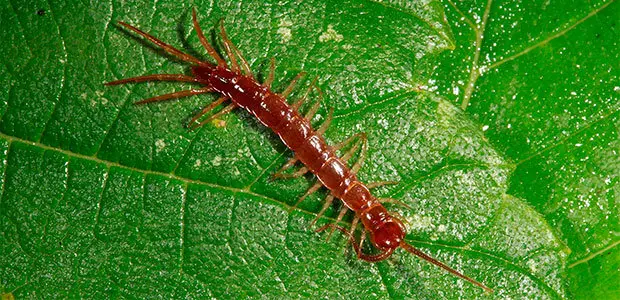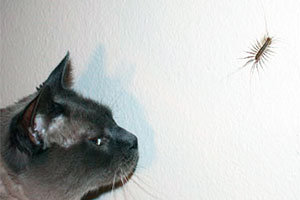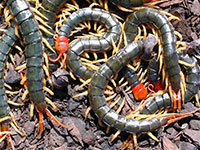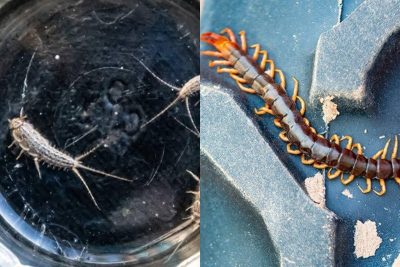Centipedes can be alarming with their numerous legs and quick movements. While they’re beneficial predators of other household pests, many homeowners prefer to keep these multi-legged creatures out of their living spaces. This comprehensive guide will help you understand what attracts centipedes to your home and how to get rid of centipedes and prevent them from returning!
Quick Picks: Best Centipede Killers

Editor’s Choice

People’s Choice

Best for Outdoor Use
What Are Centipedes?
Centipedes are arthropods belonging to the class Chilopoda, characterized by their flattened, segmented bodies with one pair of legs per segment. Despite their name suggesting “hundred legs,” centipedes typically have between 15 to 191 pairs of legs, and interestingly, they always have an odd number of leg pairs.

Appearance
Most common centipedes are grayish to reddish-brown with long antennae and venomous front legs called forcipules. House centipedes have a yellowish-gray color with 15 pairs of long, spider-like legs.
Habitat
Centipedes prefer dark, damp environments. Outdoors, they live in soil, leaf piles, and under rocks. Indoors, they gravitate toward bathrooms, basements, kitchens, and other moist areas.
Diet
Centipedes are carnivorous predators that hunt other insects and arthropods. They use venom from their forcipules to paralyze prey such as spiders, cockroaches, silverfish, and other household pests.
House Centipedes vs. Other Types
The most common centipede encountered indoors is the house centipede (Scutigera coleoptrata). Unlike some of their outdoor relatives, house centipedes are adapted to living their entire lives inside buildings. They can move extremely fast (up to 16 inches per second) and are capable of climbing walls and ceilings.

Are Centipedes Dangerous?
While centipedes are venomous, most species found in homes are not dangerous to humans. The house centipede can bite if handled, but its forcipules usually can’t penetrate human skin. If a bite does occur, the reaction is typically similar to a mild bee sting with temporary pain and swelling.
Centipede bites rarely require medical attention, but individuals with allergies may experience more severe reactions including fever, nausea, and vomiting. Small children and pets should be kept away from centipedes as a precaution.
What Attracts Centipedes to Your Home?
Understanding what draws centipedes to your home is crucial for effective control. There are several factors that make your house an attractive habitat for these multi-legged pests:
Moisture
Centipedes lack the waxy protective cuticle that many other arthropods have, making them highly susceptible to dehydration. They are strongly attracted to humid environments and will seek out the most moisture-rich areas of your home.
Food Sources
As predators, centipedes are drawn to homes that already have other pest problems. If you have a healthy population of any of the following insects, you’re more likely to attract centipedes:
- SpidersCentipedes are natural predators of spiders and will hunt them in your home.
- CockroachesThese common household pests are a favorite food source for centipedes.
- SilverfishThese moisture-loving insects often share habitats with centipedes and become their prey.
- Flies and mothsFlying insects that make their way into your home can attract hungry centipedes.
- Ants and other small insectsAny insect infestation can potentially draw centipedes seeking a meal.
Entry Points
Centipedes typically enter homes through:
- Cracks in the foundation
- Gaps around doors and windows
- Drain pipes and sump pump hoses
- Vents and utility line openings
- Through firewood brought inside
Outdoor Attractants
The immediate exterior of your home can harbor centipedes that may eventually make their way inside, especially during extreme weather conditions:

Leaf piles create ideal centipede habitats

Foundation cracks allow entry into homes

Mulch and garden debris attract centipedes
How to Get Rid of Centipedes – Best Centipede Killer Products
To effectively eliminate centipedes, you’ll need to use products specifically designed to target these pests. Here are the top three centipede killers based on effectiveness, ease of use, and customer satisfaction:
Cy-Kick CS Insecticide - Best Overall Solution
Editor's ChoiceHow Does It Work
How to Use
- Mix 1 ounce of concentrate per gallon of water
- Apply to cracks, crevices, and other areas where centipedes hide
- Treat entry points, baseboards, and perimeter areas
- Use a pump sprayer for precise application
- Reapply every 3 months for continuous protection
- Highly effective against centipedes and other pests
- Long-lasting residual protection up to 90 days
- Odorless formula leaves no visible residue
- Can be used both indoors and outdoors
- Professional-grade effectiveness for homeowner use
- More expensive than some consumer alternatives
- Requires mixing and application equipment
- Should be kept away from food preparation areas
- Protective equipment recommended during application
Ortho Home Defense Max Indoor Insect Barrier - Easiest to Use
People's ChoiceHow Does It Work
How to Use
- No mixing required - comes ready to use with an extended wand
- Apply along baseboards, around windows and doors, and in corners
- Use the extended wand to reach behind appliances and furniture
- Apply two coats for maximum protection
- Allow to dry completely before allowing pets or children in treated areas
- Ready-to-use formula requires no mixing
- Precision wand allows for easy application in hard-to-reach areas
- Dries quickly and leaves no visible residue
- Safe for use around children and pets when dried completely
- Provides up to 12 months of indoor protection
- Indoor use only
- May need more frequent application in high-moisture areas
- Less concentrated than professional-grade options
- Cannot be used on food preparation surfaces
3. Spectracide Triazicide Insect Killer for Lawns - Best for Outdoor Treatment
Best for Outdoor UseHow Does It Work
How to Use
- Apply granules evenly across your lawn using a broadcast spreader
- Create a 3-5 foot treatment zone around your home's foundation
- Water thoroughly after application to activate the product
- Apply when grass is dry and water after application
- Reapply every 2-3 months for continuous protection
- Covers large areas effectively - treats up to 5,000 square feet
- Rainproof protection lasts up to 3 months
- Treats centipedes and their food sources simultaneously
- Easy to apply with standard lawn spreaders
- Creates a protective barrier around your home
- Outdoor use only
- Must be watered in to be effective
- Only kills insects that come in contact with treated areas
- Not for use on vegetable gardens or edible plants
How to Repel Centipedes Naturally
If you prefer natural methods or want to supplement chemical treatments, there are several effective ways to repel centipedes without harsh pesticides:
Essential Oils

Several essential oils have properties that repel centipedes and other insects:
- Tea Tree Oil – Mix 25 drops with 6 ounces of water in a spray bottle. Apply to entry points and areas where centipedes have been spotted. The strong scent can repel centipedes for up to four months.
- Peppermint Oil – Create a spray with 15-20 drops per cup of water. Apply around windows, doors, and baseboards.
- Eucalyptus Oil – Similar to peppermint, this creates an effective barrier that centipedes avoid.
Diatomaceous Earth

Food-grade diatomaceous earth (DE) is a natural powder made from fossilized algae. It works by dehydrating centipedes and other insects that come in contact with it.
- Sprinkle a thin layer of DE in areas where centipedes travel
- Focus on entry points, baseboards, and dark corners
- Reapply after cleaning or if the powder becomes damp
Cayenne Pepper

Centipedes are repelled by the capsaicin in cayenne pepper. Apply a thin line around potential entry points both inside and outside your home to create a barrier that centipedes won’t cross.
Sticky Traps
Place sticky traps in corners, along walls, and in areas where centipedes are commonly seen. These traps capture both centipedes and their prey, helping to reduce overall populations.
Comprehensive Centipede Control Strategy
For the most effective results, combine multiple approaches to both eliminate existing centipedes and prevent new ones from entering your home:
Reduce Moisture
Since moisture is the primary attractant for centipedes, reducing humidity in your home is essential:
- Fix any plumbing leaks promptly
- Use dehumidifiers in damp basements and crawl spaces
- Ensure bathrooms and kitchens are well-ventilated
- Keep gutters clean and direct downspouts away from your foundation
- Maintain proper grading around your home to prevent water accumulation
Eliminate Food Sources
Addressing other pest problems will make your home less attractive to centipedes:
Pro Tips for Eliminating Centipede Food Sources
- Vacuum regularly to remove spider webs and insect eggs
- Store food in sealed containers to prevent attracting insects
- Take out trash regularly and keep garbage cans clean
- Address any existing pest problems with appropriate treatments
- Keep kitchen and bathroom drains clean to prevent small insects
Seal Entry Points
Prevent centipedes from entering by sealing potential access points:
- Foundation cracksRepair with appropriate caulk or concrete filler
- Door and window gapsInstall weatherstripping and door sweeps
- Utility openingsSeal gaps around pipes, wires, and vents
- Basement windowsEnsure windows are properly sealed and screened
- Drain coversInstall screens on floor drains, especially in basements
Outdoor Management
Create a less hospitable environment around your home’s exterior:
- Remove leaf piles, woodpiles, and debris from near your foundation
- Keep grass trimmed short, especially around the foundation
- Maintain a dry zone around your home by improving drainage
- Store firewood at least 20 feet from your home and elevated off the ground
- Use outdoor pesticides to create a protective barrier around your home
When to Call Professional Pest Control
While many centipede problems can be resolved with DIY methods, some situations call for professional assistance:
- Persistent infestations despite multiple treatment attempts
- Severe infestations with numerous centipedes seen daily
- Centipedes in hard-to-reach areas like wall voids or crawl spaces
- Complicated moisture issues requiring professional remediation
- Multiple pest problems occurring simultaneously
Professional pest control services can provide comprehensive treatment plans that address not only the centipedes themselves but also the underlying conditions attracting them to your home.
Frequently Asked Questions
Do centipedes bite humans?
Yes, centipedes can bite humans if they feel threatened or are handled. However, most house centipedes found in North America have forcipules (venom claws) that are too small to penetrate human skin effectively.
If a bite does occur, symptoms are typically mild and similar to a bee sting, causing temporary pain, redness, and swelling. Serious reactions are rare but possible in sensitive individuals.
Are centipedes harmful to my home?
Centipedes do not cause structural damage to homes. Unlike termites or carpenter ants, they don’t eat wood or building materials. They don’t contaminate food sources or spread diseases like some other household pests.
In fact, centipedes can be beneficial in some ways as they prey on other household pests like cockroaches, silverfish, and spiders. However, their alarming appearance and potential to bite make them unwelcome in most homes.
What’s the difference between centipedes and millipedes?
Centipedes and millipedes can be distinguished by several key characteristics:
Centipedes have one pair of legs per body segment, flattened bodies, and move quickly. They are carnivorous predators that can bite. Millipedes have two pairs of legs per body segment, cylindrical bodies, and move slowly. They are herbivores that feed on decaying plant material and cannot bite, though some species release a foul-smelling defensive liquid.
Do centipedes climb walls and beds?
Yes, centipedes are excellent climbers and can easily scale walls, ceilings, and furniture including beds. House centipedes have specially adapted legs that allow them to move across virtually any surface, including smooth vertical surfaces.
If you’re finding centipedes in your bed, this could indicate they’re hunting for other insects in your bedroom or that moisture levels in your home are high enough to attract them to these areas.
How long do centipedes live?
Centipedes have surprisingly long lifespans compared to many other arthropods. The common house centipede (Scutigera coleoptrata) can live for 3-7 years under favorable conditions. Other centipede species may live between 1-6 years.
They continue to molt and grow throughout their adult lives, unlike insects that reach a fixed adult size. This prolonged lifespan means that addressing centipede infestations promptly is important to prevent established populations.
Conclusion
Effectively controlling centipedes requires a multi-faceted approach that addresses the conditions attracting them to your home. By reducing moisture, eliminating food sources, sealing entry points, and using appropriate treatments, you can significantly reduce or eliminate centipede populations in your living spaces.
Remember that while centipedes may look intimidating, they actually help control other household pests. If you only occasionally spot a centipede, you might consider simply capturing and releasing it outdoors rather than reaching for pesticides. However, if you’re dealing with numerous centipedes or are uncomfortable with their presence, the methods outlined in this guide should help you reclaim your centipede-free home.
Whether you choose chemical treatments, natural remedies, or professional pest control services, consistency is key to long-term success. By maintaining a dry, well-sealed home with minimal other pest activity, you’ll create an environment that centipedes will naturally avoid.


